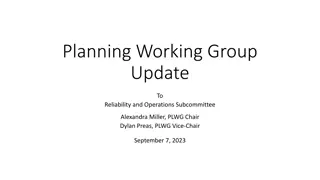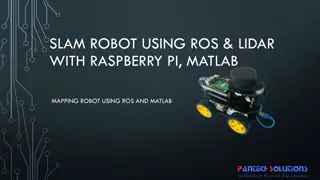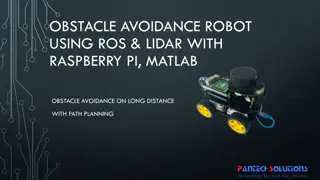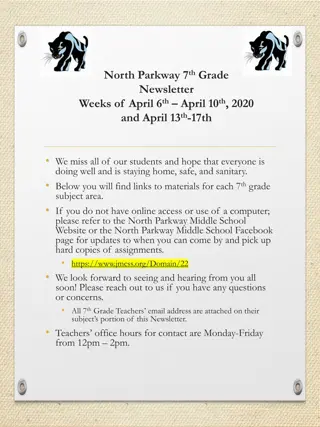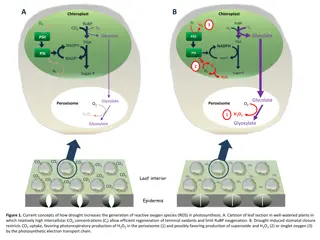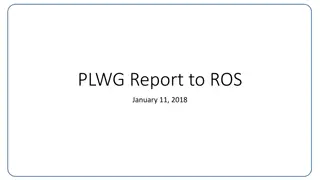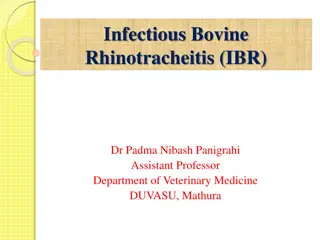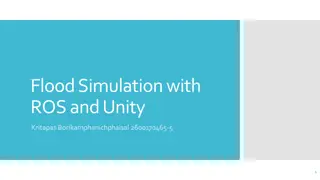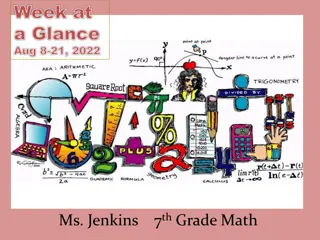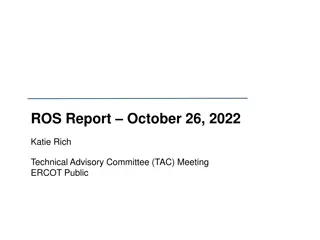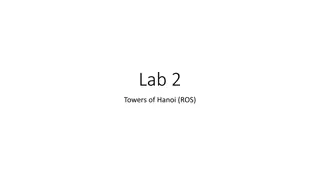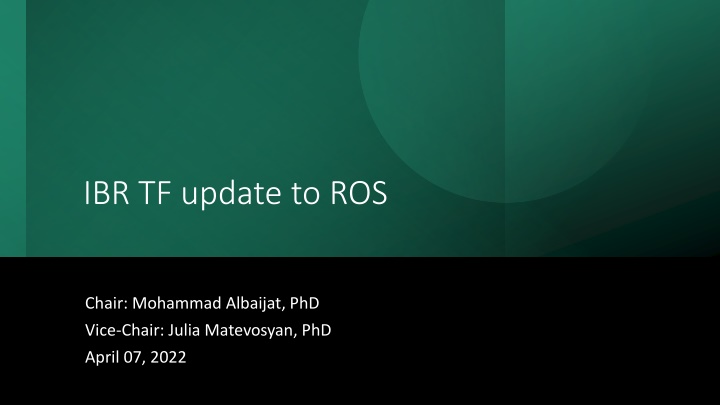
Updates on IBR TF and NERC Guidelines | April 2022 Meeting Insights
Stay informed on the latest updates from the IBR Task Force meeting, including discussions on Odessa Disturbance follow-ups, inverter tripping issues, and NERC guidelines. Explore key points on RFIs, inverter modeling, and IEEE standards harmonization, as well as ongoing actions for reliability improvement.
Download Presentation

Please find below an Image/Link to download the presentation.
The content on the website is provided AS IS for your information and personal use only. It may not be sold, licensed, or shared on other websites without obtaining consent from the author. If you encounter any issues during the download, it is possible that the publisher has removed the file from their server.
You are allowed to download the files provided on this website for personal or commercial use, subject to the condition that they are used lawfully. All files are the property of their respective owners.
The content on the website is provided AS IS for your information and personal use only. It may not be sold, licensed, or shared on other websites without obtaining consent from the author.
E N D
Presentation Transcript
IBR TF update to ROS Chair: Mohammad Albaijat, PhD Vice-Chair: Julia Matevosyan, PhD April 07, 2022
IBR TF meetings Two meetings February 18, 2022 March 18, 2022 March 18, 2022, meeting Review of NERC and other IBR WG updates IEEE 2800-2022 standards Odessa Disturbance and event process draft PGRR 075 and 085 updates Draft Interconnections Check list Discussed priorities and items for the following meeting (April 8th) February 18, 2022, meeting Odessa Disturbance follow ups Similar Inverter Model Assessment Smaller unexpected tripping event analysis Priorities
Odessa Disturbance updates Focused on 5 Follow-up RFIs representing 80% of solar Resources lost during the event Some plants have implemented mitigations, some couldn t be due to legacy inverters, further follow ups will be needed with others (to be discussed in next meetings) Specific issue of inverters tripping on overvoltage and mitigation requires further investigation with OEMs, since such behavior is not meeting ERCOT s Voltage Ride Through requirements as per NOGs. Current RFI procedure after disturbances: time consuming for staff and MPs, needs improvement and more streamlined process (to be discussed in the upcoming meetings) Follow up RFIs for May 9th event (sent 8 out of 10) Additional follow up RFIs on March 9th mainly on reduction of output by different MW values Similar Inverter Model Assessment About 8.3 GW of solar capacity using same or similar models of inverters as the ones that tripped in Odessa event. ERCOT will follow-up with RFIs to such units requesting to address potential cause of tripping ERCOT will prioritize communications based on most significant causes. Smaller unexpected tripping event analysis Smaller but similar events should be monitored to identify causes of IBR tripping and potentially prevent future larger events. ERCOT needs to streamline the process and develop events criteria for sending RFIs.
Review of NERC and other IBRWG updates IEEE 2800 Standards Standard for interconnection and interoperability of IBR interconnecting with transmission systems Discussed reliability issues with IBR (six major events) Harmonizes technical minimum capability A consensus based, voluntary IEEE performance standard Approved in January 2022 and publication in April/May 2022 In scope: IBR plant, hybrid IBR plant. Out of scope: hybrid plant (multiple IBR and non-IBR resources operated as one by TS operator), co located plant (multiple resources operated separately by TS operator) NERC IBR performance subcommittee is exploring performance of utility scale inverter resources directly connected to bulk power system Guidelines and reports on IBR performance Latest reports include: Utilizing the excess capability of IBRs for frequency support (NERC paper September 2021) White paper published December 2021 Grid Forming Technology Follow-ups on NERC disturbance reports and alerts (Several NERC reports covering all major events including Odessa Disturbance) Ongoing activities related to reliability guidelines ACTION: Gap analysis to be performed on ERCOT rules vs. IEEE 2800
PGRR 075 and 085 updates Draft Interconnection Check list It s a pre draft questionnaire meant to draw attention of all stakeholders to participate in finalizing formal proposal to ensure reliability in reasonable fashion Five questions focused on making sure that new IBRs read and implemented relevant NERC guidelines, read and implemented recommendations from NERC event reports, read and implemented if new IBR is going to be connected at a distribution level, read and implemented applicable standards and relevant nodal protocol operating guide requirements PGRR-075 effective May 1, 2020, and PGRR-085 effective March 2021 PGRR-075 Introduced model quality test(MQT) requirements for PSS/E dynamic model PGRR-085 introduced MQT and unit model validation requirements for PSCAD model Both: Unit model validation (Resource interconnection) and Plant model verification (commissioning and operation) Dynamic model requirements (model quality test for PSS/E, model quality test for PSCAD model, unit model validation for PSCAD model and model parameter verification) It seems there is a push back on this questionnaire as it is. But again, this was an informal proposal meant to engage stakeholders to participate in formulating a formal proposal
Priorities and items for next meeting Gap analysis between ERCOT nodal protocols and guide requirements and IEEE2800 Standard. Specifically, we wanted to know where IEEE2800 exceeds ERCOT rules and where both ERCOT and IEEE2800 meet and where ERCOT exceeds IEEE2800. Strategy of adoption IEEE2800 Continuous follow up on RFI on the Odessa event IBR Ride-Thru failures monthly update Draft interconnection check list discussion OEM scenarios and simulations


